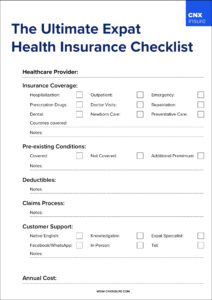In this ultimate checklist we navigate through the complexities of selecting the right insurance plan to safeguard your health by assessing your insurance across 6 vital elements…
Drawing from years of expertise and insights from seasoned expatriates, we’ll delve into the essential steps and considerations necessary to make informed smart decisions on the right expat health insurance policy for you and your family.
From understanding the local healthcare landscape to deciphering policy terms and coverage options, this checklist will empower you to navigate the often daunting world of expat health insurance with confidence. Our guide aims to equip you with the knowledge and tools needed to protect your health and peace of mind wherever life takes you.
Download the Free Checklist now (no optin-needed)
Join us as we embark on this essential journey to ensure your well-being knows no boundaries. Let’s dive into “The Ultimate Expat Health Insurance Checklist” so you are fully prepared to live the dream whatever comes your way.
If after reading this you want to go deeper, then check out the article How to select your expat health insurance agent.

1: Insurance Coverage:
As an expat in Thailand, understanding the extent of your health insurance coverage is paramount. Begin by examining the scope of coverage offered by each plan, ensuring it aligns with your healthcare needs. Comprehensive insurance policies typically include coverage for hospitalization, outpatient services, emergency care, and prescription medications. However, some plans may have limitations on coverage for certain treatments or services, so it’s essential to review the policy details thoroughly.
Moreover, consider whether the insurance coverage extends beyond Thailand’s borders. If you frequently travel or plan to reside in neighboring countries, having international coverage ensures you can access medical care wherever you go. Look for policies that offer worldwide coverage or specific provisions for medical treatment outside of Thailand.
Additionally, pay attention to the network of healthcare providers affiliated with each insurance plan. Choose a policy that provides access to reputable hospitals, clinics, and specialists in Thailand, ensuring you receive quality healthcare services when needed.
There’s nothing more annoying than arriving at hospital (which is never a fun experience) only to be told that your insurance isn’t covered here. Select a better health provider to avoid this, and ensure you check the documentation to raise your awareness of the hospitals your insurance is accepted at.
CNX Tip
2: Consider Pre-existing Conditions:
For expats with pre-existing medical conditions, navigating health insurance options can be more complex. It’s essential to inquire about how each insurance plan covers pre-existing conditions, as policies may vary significantly in their approach.
Some (most) insurance providers may exclude coverage for pre-existing conditions altogether, meaning any medical treatment related to your pre-existing condition would not be covered under the policy. Others may offer coverage but impose waiting periods before benefits become available for pre-existing conditions. During this waiting period, you may be responsible for covering the costs of treatment out-of-pocket.
Due to the pre-existing condition policy it is recommend to stick with one provider for a long time, rather than adjust each year. So we recommend taking extra care on choosing your first expat policy, and treat it as a long-term decision thus providing you greater health coverage.
CNX Tip
When evaluating insurance options, disclose any pre-existing conditions upfront and inquire about the specific terms and limitations regarding coverage. Consider seeking guidance from insurance agents or brokers who can help you navigate the complexities of pre-existing condition coverage and find a policy that meets your needs.

3: Inclusions / Exclusions:
Digging into the inclusions and exclusions of each insurance policy is crucial to understanding what medical services and treatments are covered. Inclusions typically encompass a range of healthcare services, including doctor visits, hospital stays, diagnostic tests, surgeries, and prescription medications. However, it’s equally important to identify exclusions—services or treatments not covered by the policy.
Dental is usually only included in the top packages.
CNX Tip
Common exclusions may include elective procedures, cosmetic treatments, experimental therapies, and certain pre-existing conditions. Additionally, some policies may impose limits on coverage for specific treatments or place restrictions on coverage for certain medical conditions.
Carefully review the policy documents provided by each insurance provider to identify both the inclusions and exclusions. Pay attention to any limitations or restrictions that may affect your access to medical care and consider how these factors align with your healthcare needs and priorities. By understanding the scope of coverage offered by each policy, you can make an informed decision about which insurance plan best suits your requirements.
4: Deductibles:
Deductibles play a significant role in determining your out-of-pocket expenses for medical care under an insurance plan. A deductible (also known as the ‘excess’) is the amount you must pay before your insurance coverage kicks in, typically on an annual basis. When choosing a health insurance policy as an expat in Thailand, carefully consider the deductible amount and how it aligns with your budget and healthcare needs.
Higher deductibles often result in lower monthly premiums, making them an attractive option for those looking to reduce their insurance costs. However, keep in mind that a higher deductible means you’ll need to pay more upfront before your insurance coverage begins. Conversely, lower deductibles may lead to higher monthly premiums but require less out-of-pocket spending when accessing medical care.
When evaluating deductibles, assess your financial situation and healthcare utilization patterns. If you anticipate needing frequent medical care or have ongoing health issues, a lower deductible may provide greater financial protection. On the other hand, if you’re generally healthy and don’t expect to require extensive medical treatment, opting for a higher deductible could help lower your overall insurance expenses.
Consider how the deductible interacts with other aspects of the insurance policy, such as co-payments and coinsurance. Some policies may have separate deductibles for different types of services, such as hospitalization versus outpatient care. Understanding these nuances will help you choose a deductible amount that strikes the right balance between affordability and coverage.
5: The Claims Process:
Navigating the claims process is an integral part of utilizing your health insurance coverage effectively. Understanding how to submit claims and what to expect during the reimbursement process can help streamline your experience and ensure timely access to medical care.
We have had several occasions where a hospital staff member has refused to accept insurance (internal hospital policy perhaps), requiring direct payment, and then you need to get reimbursed through your insurance. On several occasions we have been able to speak with the hospital, after which they have accepted payment is taken directly through your insurance provider – which is highly preferable.
CNX Tip
Start by familiarizing yourself with the specific requirements and procedures for submitting claims with your insurance provider. Most insurance companies offer multiple channels for claim submission, including online portals, mobile apps, and traditional paper forms. Determine which method works best for you and gather any necessary documentation, such as medical bills, receipts, and treatment records.
Once you’ve submitted a claim, keep track of its status and be prepared to follow up if necessary. Insurance companies typically have processing times for claims, so patience may be required while awaiting reimbursement. If you encounter any issues or discrepancies during the claims process, don’t hesitate to reach out to your insurance provider for assistance.
Your insurance broker should be assisting you with this process.
CNX Tip
By educating yourself about the claims process and staying proactive in managing your insurance coverage, you can navigate the system with confidence and ensure you receive the benefits you’re entitled to as an expat in Thailand.
6: Customer Support / Insurance Agent:
Access to reliable customer support and assistance from knowledgeable insurance agents is essential for expats navigating the complexities of healthcare in Thailand. For many this is there top selection criteria. Whether you have questions about policy coverage, need help understanding claim procedures, or require assistance in emergencies, responsive customer support can make all the difference in your healthcare experience.
When evaluating insurance providers, inquire about the availability and accessibility of customer support channels. Look for companies that offer multiple contact options, such as phone, email, and live chat, to ensure you can reach them when needed. Additionally, consider the availability of multilingual support, especially if you’re not fluent in Thai, to facilitate clear communication and understanding.
Some companies also use social media such as Facebook Pages, Groups, WhatsApp groups (as CNX Insurance does) to enable easy and transparent communication with policy holders.
CNX Tip
Insurance agents or brokers can also provide invaluable assistance in selecting the right insurance policy and navigating the enrollment process. Seek out agents who specialize in expat health insurance and have a thorough understanding of the unique needs and challenges faced by expatriates in Thailand. A knowledgeable agent can help you compare different insurance options, explain policy terms and conditions, and address any concerns or questions you may have.
Easy of communication
Furthermore, assess the level of ongoing support provided by the insurance company or agent throughout your coverage period. From assisting with policy renewals to addressing changes in your healthcare needs, reliable customer support ensures you have assistance every step of the way.
Ultimately, prioritizing customer support and access to experienced insurance agents can help you make informed decisions, navigate the healthcare system with ease, and enjoy peace of mind knowing you have support when you need it most as an expat in Thailand.

Conclusion:
In conclusion, “The Ultimate Expat Health Insurance Checklist” serves as a comprehensive guide for expatriates navigating the intricacies of healthcare coverage in Thailand. By downloading and following the checklist’s step-by-step approach, expats like you can make informed decisions and select insurance policies that align with their healthcare needs, budget, and lifestyle.
From evaluating insurance coverage and considering pre-existing conditions to understanding deductibles and the claims process, this checklist provides valuable insights to ensure expats are well-prepared for any healthcare scenario. By taking a proactive approach to managing their health insurance coverage, expatriates can enjoy peace of mind knowing they have access to quality healthcare services while living abroad.
Investing more time into your initial selection, and sticking with that provider long-term provides significant health coverage benefits due to new insurance policies not covering pre-existing conditions. For a deeper dive on how to select your expat health agent read this article.
CNX Tip
Ultimately, “The Ultimate Expat Health Insurance Checklist” empowers expatriates to navigate the complexities of healthcare with confidence and clarity, allowing them to focus on embracing their new life experiences in Thailand while safeguarding their health and well-being.





